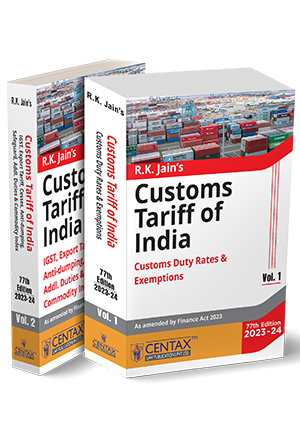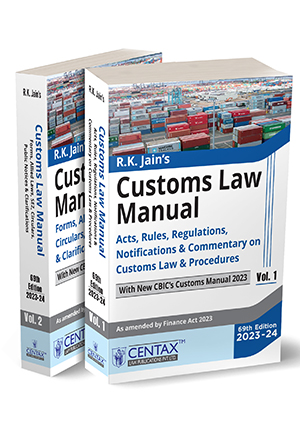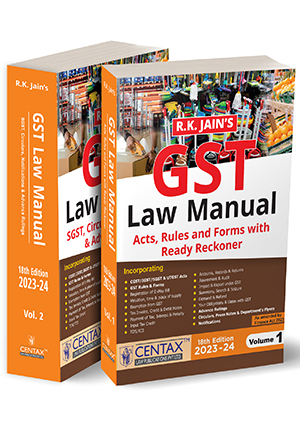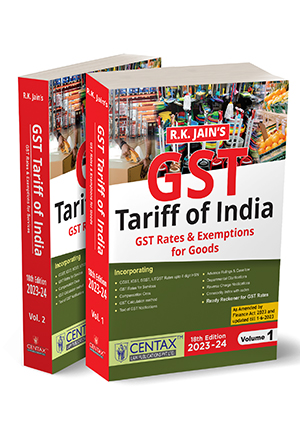Weekly Round-up on Tax and Corporate Laws | 13th to 18th May 2024
- Blog|Weekly Round-up|
- 9 Min Read
- By Taxmann
- |
- Last Updated on 21 May, 2024
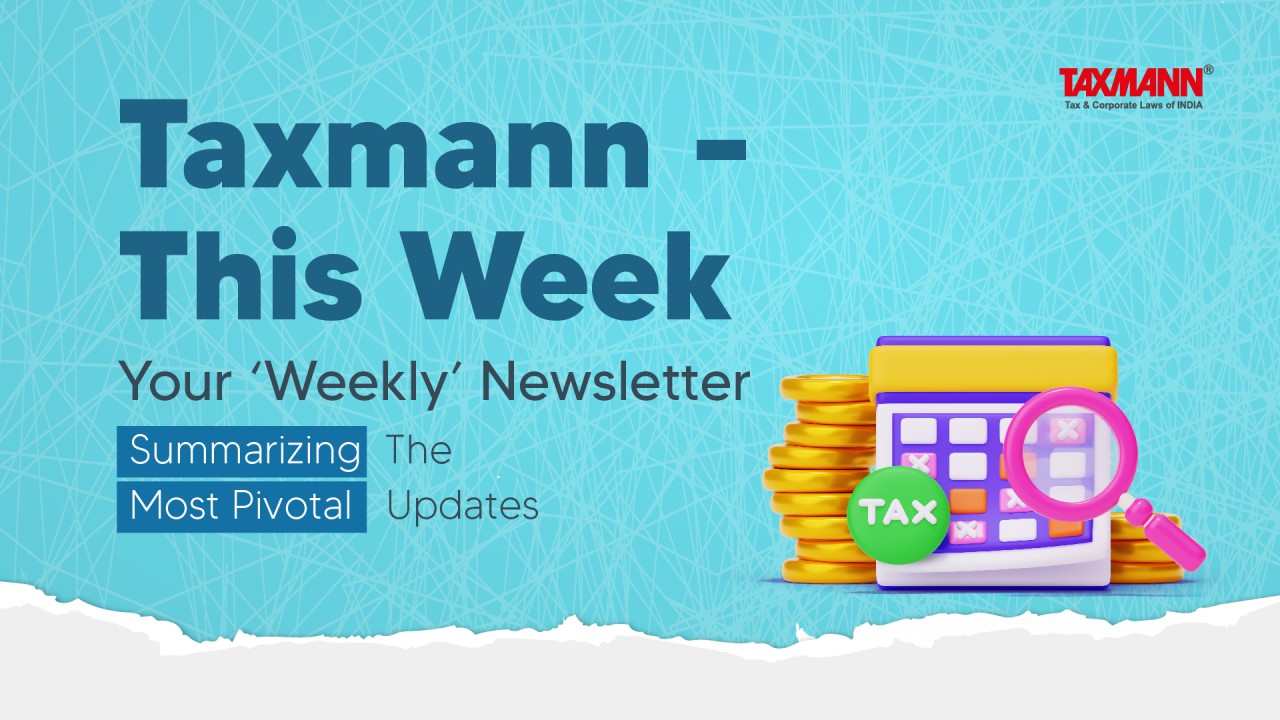
This weekly newsletter analytically summarises the key stories reported at taxmann.com during the previous week from May 13 to 18th, 2024, namely:
- SEBI proposes to expand Overseas Investments by Indian Mutual Funds;
- Receiving gifts through banking channels does not establish genuineness of transaction: HC;
- Appellate authority cannot proceed if SCN was issued by an incompetent officer: HC;
- Registration deemed to be cancelled from date of first application since assessee did not want to continue business: HC; and
- CARO 2020: Summary of observations identified and guidance provided by QRB of ICAI.
1. SEBI proposes to expand Overseas Investments by Indian Mutual Funds
SEBI has released a consultation paper on easing investments by Indian mutual funds in overseas funds. The objective of the consultation paper is to seek public comments on the proposal to ease investments by Indian Mutual Funds (MFs) in Overseas Mutual Funds/Unit Trusts that invest a certain portion of their assets in Indian securities. The comments on the same may be submitted by June 7, 2024.
(a) Need for Consultation Paper
As per the current regulatory framework, SEBI-registered Mutual Funds are allowed to invest in certain specific eligible overseas securities such as American Depositories Receipts (ADRs)/Global Depositories Receipts (GDRs) issued by Indian or foreign companies, money market instruments rated not below investment grade, and equity of overseas companies listed on a recognised stock exchange.
However, the current framework restricts Indian Mutual Funds from investing in overseas mutual funds/unit trusts that have exposure to Indian securities. This limitation has led many mutual funds in the industry to avoid such investments. The proposed changes aim to address this issue and provide more opportunities for Indian mutual funds.
SEBI noted that given India’s strong economic growth prospects, Indian securities offer an attractive investment opportunity for foreign funds. Consequently, various international indices, exchange-traded funds (ETFs), MFs and UTs allocate a portion of their assets to Indian securities.
For example, the MSCI Emerging Markets Index had an 18.08% weightage to Indian securities as of April 30, 2024. Similarly, JP Morgan’s Emerging Markets Opportunities Fund held approximately 15% in Indian investments as of March 31, 2024.
Therefore, SEBI is considering allowing Indian mutual funds to invest in overseas funds with limited exposure to Indian securities.
(b) SEBI’s Proposal
Given consultation with stakeholders and the Mutual Fund Advisory Committee (MFAC), SEBI has proposed to allow Indian mutual funds to invest in overseas MFs/UTs that invest a particular portion of their assets in Indian securities. This is subject to the condition that the total exposure to Indian securities by such overseas funds should not exceed 20% of their net assets.
(c) Guidelines for investing in overseas MFs/UTs
While investing in overseas MFs/UTs, the Indian mutual fund schemes must ensure that the contribution of all investors in an overseas MF/UT is pooled into a single investment vehicle without the presence of any side vehicles. Further, the corpus of an overseas MF/UT must be a blind pool (i.e. common portfolio) with no segregated portfolios. All overseas MF/UT investors must have pari-passu and pro-rata rights in the fund.
(d) Independent Fund Manager
An officially appointed, independent investment manager/fund manager must manage the overseas MF/UT and be actively involved in making all investment decisions for the fund. This ensures that the investments are made autonomously by the investment manager/fund manager without influence from investors or undisclosed parties.
(e) What if total exposure breaches the 20% limit?
SEBI specifically mentioned that if the exposure to Indian securities by overseas mutual funds/unit trusts is above 20% at the time of investing (both fresh and subsequent), it shall be considered non-compliance.
However, if the exposure to Indian securities exceeds 20% of their net assets after investing in an overseas fund, an observance period of 6 months must be permitted for the Indian mutual fund schemes to monitor any portfolio rebalancing activity by the underlying overseas MF/UT. Further, during the observance period, the Indian Mutual Fund scheme must not undertake fresh investments in such overseas MF/UT. It may resume its investments if the exposure to Indian securities by such overseas MF/UT falls below the 20% limit.
Read the Consultation Paper
2. Receiving gifts through banking channels does not establish genuineness of transaction: HC
The assessee, an individual, received gifts from six individuals, aggregating to Rs. 14,50,000. During the assessment proceedings, the Assessing Officer (AO) asked the assessee to furnish the details of the gift and the donor. In response, the assessee furnished the confirmation from the donors along with their PAN, acknowledgement of having filed the return of income, and the bank statement showing the gift amount credited to the assessee’s bank account.
Unsatisfied with the explanation, the AO treated the gift as unexplained income under Section 68. On appeal, the Tribunal upheld the order of AO and confirmed his addition. Aggrieved by the order, the assessee filed an appeal before the Allahabad High Court.
The High Court held that the assessee was well-to-do, whereas the donors were persons of modest means. In the absence of any relationship shown or basis disclosed for the generation of the gift, the Tribunal disbelieved the explanation furnished by the assessee on the preponderance of probability emerging from the evidence led by the parties.
Insofar as the income tax assessment is purely a civil proceeding, the test of preponderance of probability applied by the Tribunal cannot be faulted. In the context of the gift set up by the assessee, merely because the assessee may have been able to establish such a gift was received through the bank channel and merely because the donors may not have disputed the gift made may never have been enough to establish the genuineness of the transaction.
The High Court held that slight differences in test may continue to exist in cases involving gifts and deposits that are to be repaid by the recipient. Insofar as the gift claimed by the petitioner amounted to a change of title in the money, the High Court did not find any defect in the course adopted by the Tribunal in disbelieving the claim based on holistic consideration of the material before the Tribunal.
Read the Ruling
3. Appellate authority cannot proceed if SCN was issued by an incompetent officer: HC
The Delhi High Court has held that the Appellate Authority could have only quashed the Show Cause Notice (SCN) if an incompetent officer had issued it.
The petitioner had filed a refund application, which the department rejected, and the adjudication order was passed. The Adjudication order was preceded by an SCN proposing to reject the application seeking a refund. The petitioner filed an appeal and contended that a superintendent issued SCN and was not the competent authority to issue SCN. However, the Adjudicating Authority passed the order.
The Appellate Authority held that since SCN was issued by a superintendent, who was not a competent authority, and the reply to SCN had been considered and examined by a superintendent, who was not a competent authority and only competent authority under the law could have examined reply to SCN and Adjudicating Authority had not applied its independent mind while rejecting refund. But it considered the petitioner’s case on merits and upheld the rejection of the refund application, and the appellant filed a writ petition.
The High Court noted that in the present case, the Appellate Authority held that an incompetent officer issued the SCN, proceeded to consider the petitioner’s case on merits, and upheld the rejection of the refund application. However, the Appellate Authority could only quash the SCN and proceedings emanating therefrom while reserving the right of the Proper Officer to initiate appropriate proceedings. Therefore, it was held that the order passed by the Appellate Authority was liable to be set aside.
Read the Ruling
4. Registration deemed to be cancelled from date of first application since assessee did not want to continue business: HC
The Delhi High Court has held that the registration of the assessee is to be treated as cancelled from the date of the first application if the application of the assessee seeking cancellation of registration is rejected twice without giving any cogent reason.
The petitioner was engaged in the trading of polymers and ethylene. It filed an application for cancellation of GST registration on 30-05-2023 on the grounds of closure of business. However, the said application was rejected by an order dated 07-12-2023. Thereafter, it again applied for cancellation of the GST registration on 14-12-2023 on the grounds of closure of business, and the application was rejected.
It filed a writ petition against the rejection of the application and contended that it was rejected by merely mentioning that it was rejected in accordance with the provisions of the CGST Act since the reply was not satisfactory and the order did not give any particulars or details.
The High Court noted that the department did not give any specific reasons for rejection. The mere cancellation of registration does not preclude the department from taking action in accordance with law to recover any tax, penalty, or fine that may be due.
In the instant case, no such ground was taken by the department. Therefore, it was held that the registration of the petitioner was to be treated as cancelled with effect from 30-05-2023, i.e., the date when the petitioner first filed an application seeking cancellation of GST registration, and the department was not precluded from taking any steps for recovery of any tax, penalty or interest that may be due.
Read the Ruling
5. CARO 2020: Summary of observations identified and guidance provided by QRB of ICAI
A review of the quality of audit services performed by audit firms is an important mechanism for improving audit quality. In this regard, the role performed by the Quality Review Board (QRB) over the years is significant. The quality reviews conducted by QRB bring out instances of various non-compliances regarding:
- Auditing requirements, e.g. Standards on Quality Control, Standards on Auditing, audit reports, CARO, and
- Accounting requirements, e.g. Accounting Standards, Indian Accounting Standards, Schedule VI of Companies Act, 1956/Schedule III of Companies Act, 2013.
The compilation and summary of instances of non-compliance with CARO 2020 and the guidance provided by QRB based on these observations are as follows:
(a) Clause 3(i)(a)(A) of CARO 2020 mandates the auditor to report on the quantitative details and situation of the property, plant, and equipment (PPE) in addition to maintaining the company’s register of PPE. In this regard, the auditor shall obtain a full description of the property, original cost, useful life of the assets, residual value, Location of the PPE, etc.
(b) Clause 3(i)(c) of CARO 2020 mandates the auditor to report on the title and deeds of the immovable property and check whether the company has classified such PPE according to applicable financial reporting. In this regard, the auditor may seek assistance from a legal expert if there are disputes or legal proceedings concerning the ownership title.
(c) Clause 3(iii)(c) of CARO 2020 mandates the auditor to report upon the schedule of repayment of principal and payment of interest and on the regularity of repayments of the principal amount of loans/advances in nature of loans. If the amount is overdue by more than ninety days, then the company should take reasonable steps to recover the principal and interest.
(d) Clause 3(v) of CARO 2020 mandates the auditor to report on the deposits taken by the company even if the same has not been taken in the current year but in prior years.
(e) Clause 3(vii)(a) of CARO 2020 mandates the auditor to report upon whether the company is regular in depositing undisputed statutory dues, including Goods and Services Tax, provident fund, employees’ state insurance, income-tax, sales tax, service tax, the duty of customs, the duty of excise, value added tax, cess, etc., if not then the extent of arrears of outstanding statutory dues as on the last day of the financial year concerned for a period of more than six months from the date they became payable, shall be reported.
(f) Clause 3(vii)(b) of CARO 2020 mandates the auditor to report on unpaid statutory dues due to disputes, specifying amounts, and the adjudicating forum. This covers various dues like income tax, GST, etc., even minor ones. Even if such dispute and amount is provisioned in accounts or not.
(g) Clause 3(ix)(a) of CARO 2020 mandates the auditor to report on repayment dues defaults to financial institutions or debenture holders in addition to the Banks. In this regard, the auditor shall obtain the repayment schedule and loan agreement, verify payment against the bank agreement, etc.
(h) The auditor is also required to comment in his audit report on where the auditor notices any fraud by the company or on the company has been noticed or reported during the year. Apart from reporting the existence of fraud, the auditor must also report the nature of fraud and the amount involved, including their nature and amount under Clause 3(xi) (a) of CARO 2020.
(i) Clause 3(xiv) (a) of CARO 2020 mandates the auditor to comment on an internal audit system. In this regard, the auditor shall consider the size and complexity of the business and reporting structure and ensure that the audit systems are working effectively.
Read the Story
Disclaimer: The content/information published on the website is only for general information of the user and shall not be construed as legal advice. While the Taxmann has exercised reasonable efforts to ensure the veracity of information/content published, Taxmann shall be under no liability in any manner whatsoever for incorrect information, if any.






